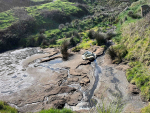A teenage worker needed three fingers partially amputated when his summer holiday job went horribly wrong in a workplace incident with a leading stone fruit producer in Central Otago.
Matthew Nevill, who was 19 at the time, was trying to fix a chain on a conveyor belt at Clyde Orchards in February 2021, when his hands were drawn into the machine.
Nevil had two fingers fractured on his left hand and required surgery to partly amputate three fingers on his right hand.
In a reserved decision of the Alexandra District Court, Clyde Orchards (1990) Limited has now been sentenced for its health and safety failures related to the incident.
A fine of $225,000 was imposed and $37,465 in reparations were ordered to be paid.
A WorkSafe investigation found poor safeguarding of the machinery and an inadequate risk assessment contributed to the victim’s injuries.
There were also no lockouts to safely isolate and de-energise the parts of machinery that could cause harm to workers.
The conveyor involved has now been decommissioned.
“The injuries in this case were significant and affected the independence of Mr Nevill, who was on his fifth consecutive summer working for Clyde Orchards,” says WorkSafe area investigation manager Steve Kelly.
“Although he [Nevill] was the unfortunate victim, it could have been anyone on staff given the risks that were present,” says Kelly.
“Seasonal workers are just as entitled to health and safety protection as those who work year-round in a business. The shortcomings in this case are simply not good enough, when we know seasonal workers are at greater risk of workplace harm,” he says.
Kelly says seasonal work and tasks like harvest can put a huge amount of pressure on everyone involved, meaning that managing the risks is essential.
“The lives, health and wellbeing of workers must be your number one priority,” he says. “We will continue to hold manufacturers to account for failing in their health and safety responsibilities.”



















